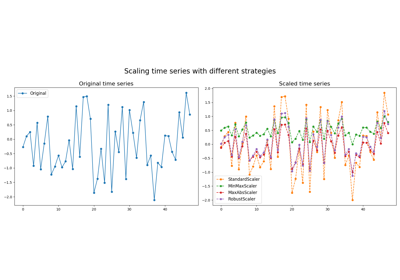pyts.preprocessing.MinMaxScaler¶
-
class
pyts.preprocessing.MinMaxScaler(sample_range=(0, 1))[source]¶ Transforms samples by scaling each sample to a given range.
Parameters: - sample_range : tuple (min, max) (default = (0, 1))
Desired range of transformed data.
Examples
>>> from pyts.preprocessing import MinMaxScaler >>> X = [[1, 5, 3, 2, 9, 6, 4, 7], ... [1, -2, 3, 2, 2, 1, 0, 2]] >>> scaler = MinMaxScaler() >>> scaler.transform(X) array([[0. , 0.5 , 0.25 , 0.125, 1. , 0.625, 0.375, 0.75 ], [0.6 , 0. , 1. , 0.8 , 0.8 , 0.6 , 0.4 , 0.8 ]])
Methods
__init__(self[, sample_range])Initialize self. fit(self[, X, y])Pass. fit_transform(self, X[, y])Fit to data, then transform it. get_params(self[, deep])Get parameters for this estimator. set_params(self, \*\*params)Set the parameters of this estimator. transform(self, X)Scale samples of X according to sample_range. -
__init__(self, sample_range=(0, 1))[source]¶ Initialize self. See help(type(self)) for accurate signature.
-
fit_transform(self, X, y=None, **fit_params)¶ Fit to data, then transform it.
Fits transformer to X and y with optional parameters fit_params and returns a transformed version of X.
Parameters: - X : numpy array of shape [n_samples, n_features]
Training set.
- y : numpy array of shape [n_samples]
Target values.
- **fit_params : dict
Additional fit parameters.
Returns: - X_new : numpy array of shape [n_samples, n_features_new]
Transformed array.
-
get_params(self, deep=True)¶ Get parameters for this estimator.
Parameters: - deep : bool, default=True
If True, will return the parameters for this estimator and contained subobjects that are estimators.
Returns: - params : mapping of string to any
Parameter names mapped to their values.
-
set_params(self, **params)¶ Set the parameters of this estimator.
The method works on simple estimators as well as on nested objects (such as pipelines). The latter have parameters of the form
<component>__<parameter>so that it’s possible to update each component of a nested object.Parameters: - **params : dict
Estimator parameters.
Returns: - self : object
Estimator instance.


